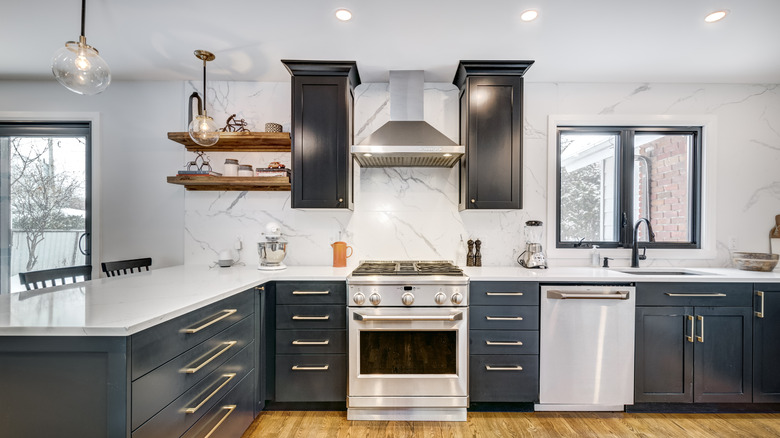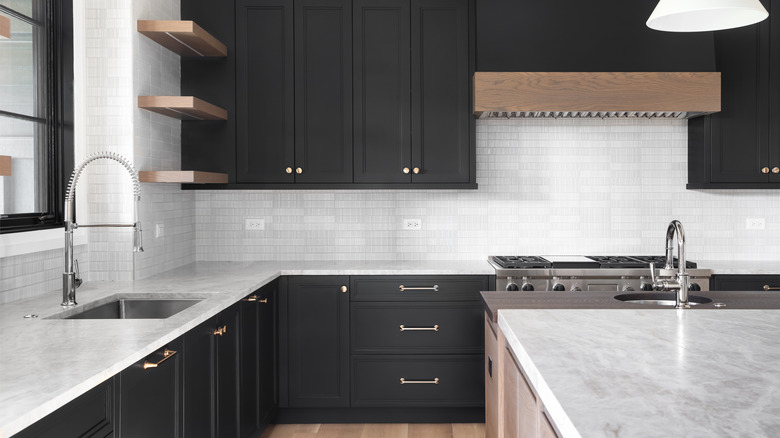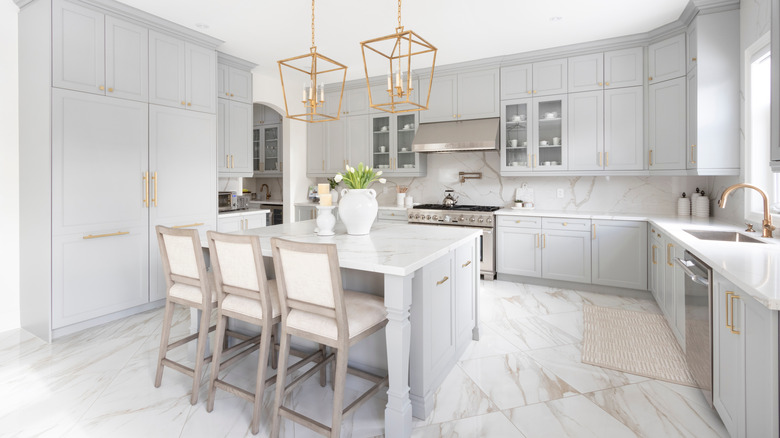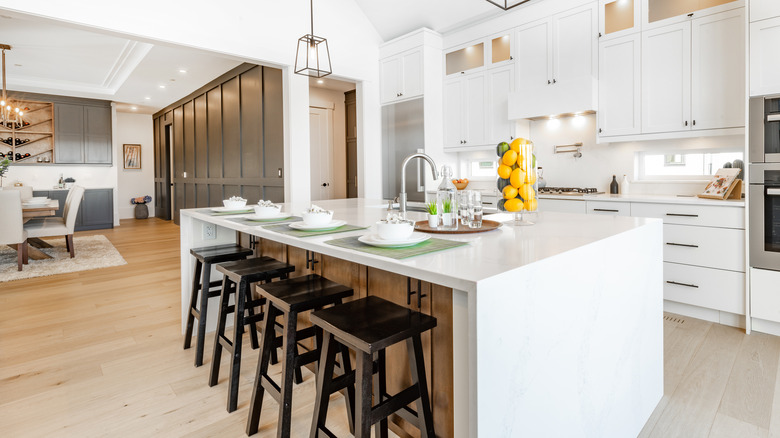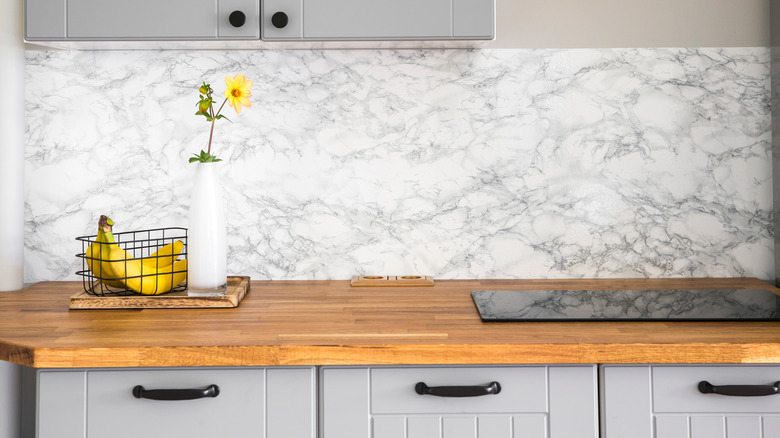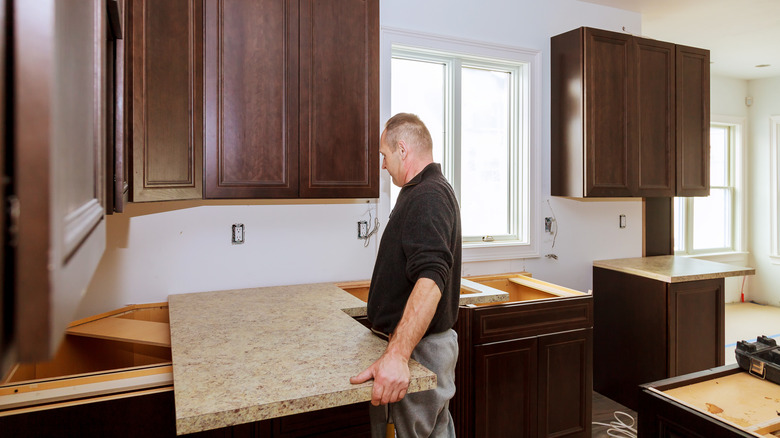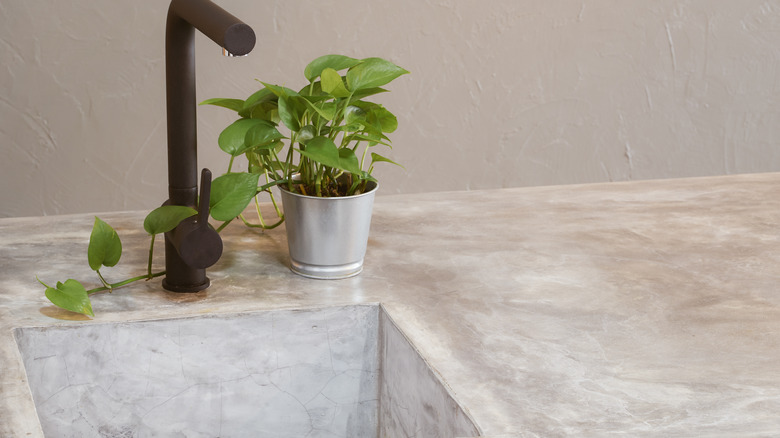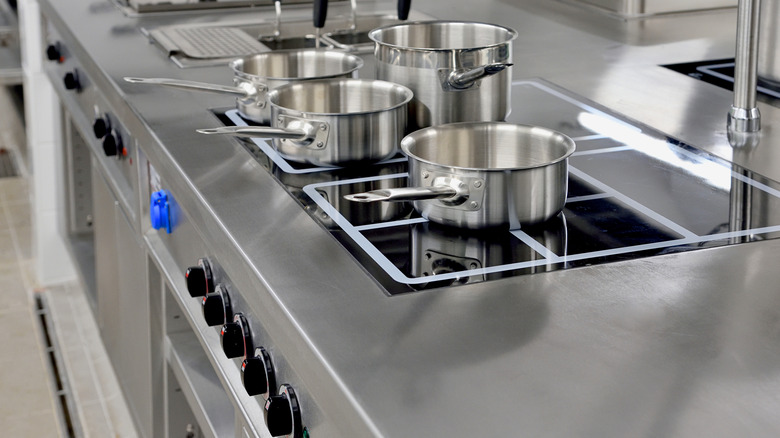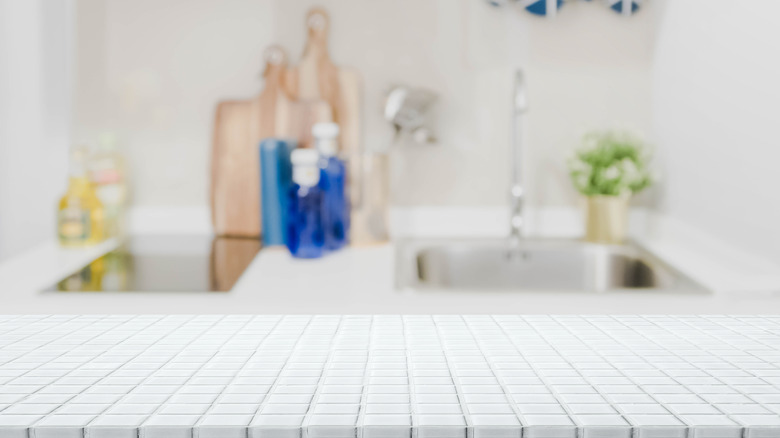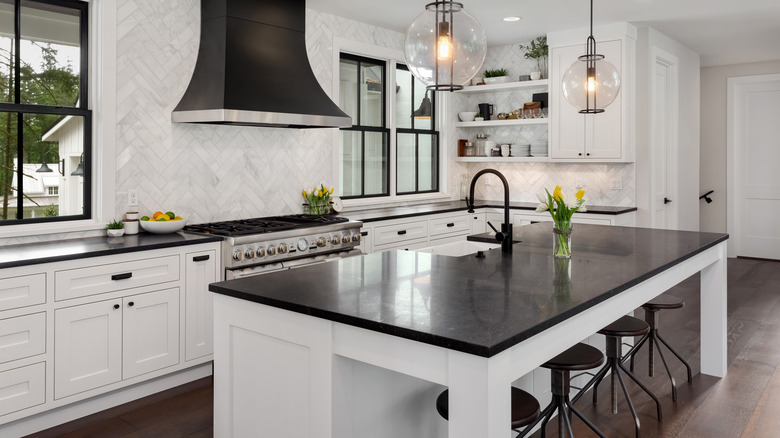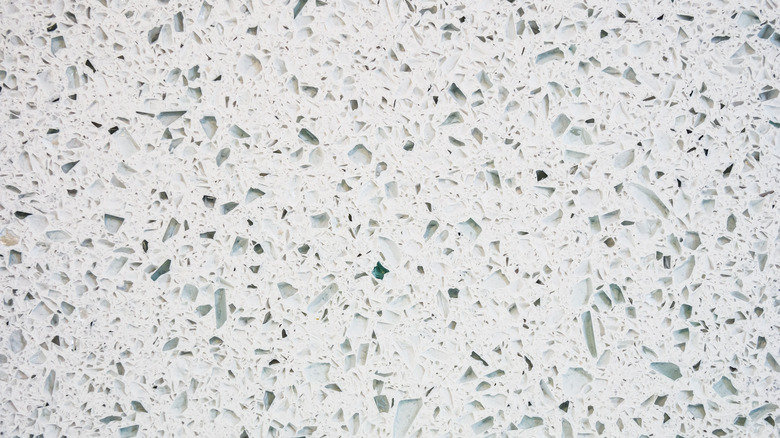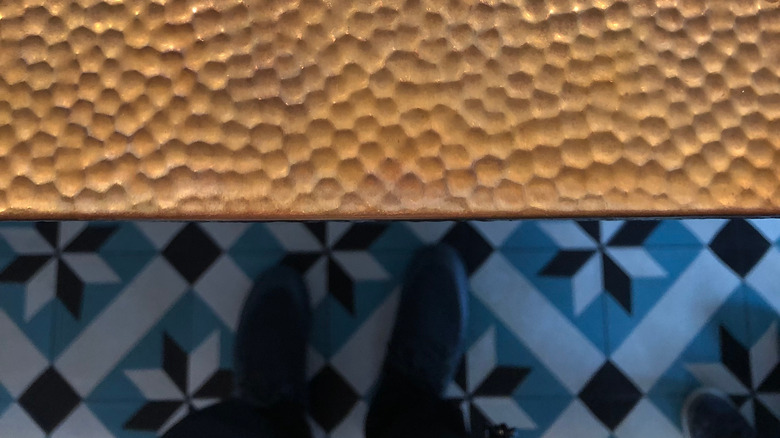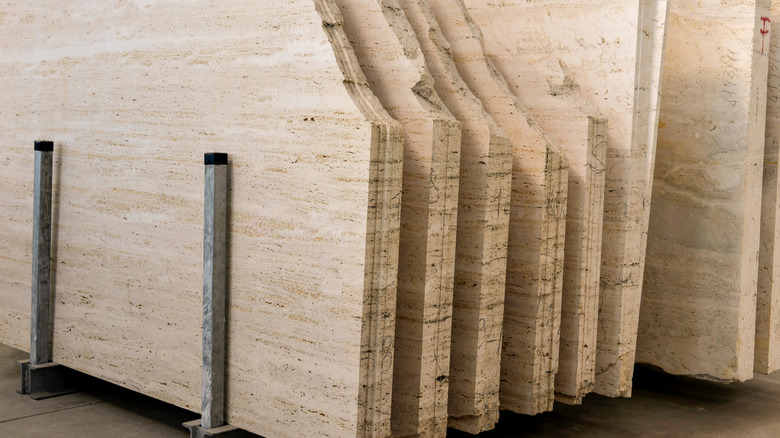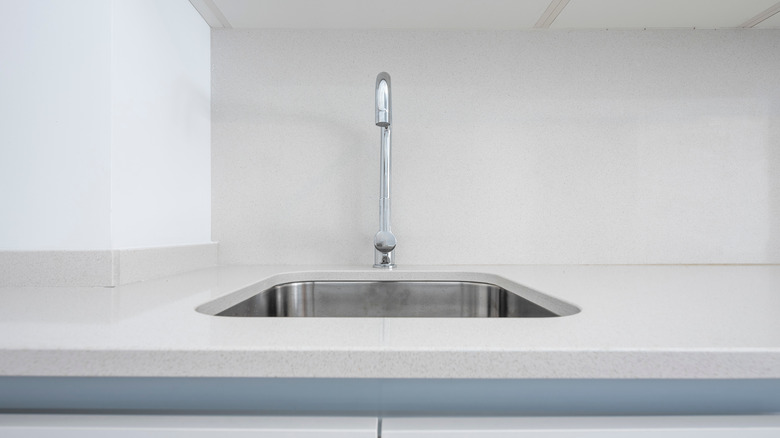15 Types Of Countertops You Should Know Before Your Kitchen Remodel
Apart from perhaps the cabinets, countertops are one of the primary focal points in any kitchen, as noted by Houzz. Everything from the backsplash to the paint color to the cabinetry should coordinate with your choice of countertops, and there's a lot to consider beyond the mere appearance. Yes, you want your countertops to mesh with your overall design aesthetic, but all the different countertop materials have their own pros and cons. Before you select the countertops you want in your kitchen remodel, you should take a bit of time to really contemplate how you use the space, and what you want from the materials.
Is durability the key consideration? Do you want something that has minimal upkeep, or are you willing to put in a little extra work for a look that you love? How much of the material do you need — and what's your overall budget? While there are less expensive and more expensive options for every material, there's a particularly massive difference between the various ends of the spectrum when it comes to countertop materials.
If you're having trouble deciding which countertop material truly speaks to you, don't worry — we've got you covered. Here are 15 different types of countertops that you should know about before your kitchen remodel, and a little about them, so you can determine which one is the right fit for you specifically.
1. Granite
Granite is one of the more popular materials when it comes to countertops. In terms of the overall aesthetic, granite comes in a huge variety of colors, with The Spruce saying that nearly 3,000 different hues are available. It also ranks high on the list of countertop materials for durability — if treated properly with a sealer, according to Popular Mechanics, granite becomes nearly stain-resistant and maintenance-free. It can handle heat, and the long-standing popularity of granite means it may also add value to your home.
One of the major cons is simply the cost — typically, granite comes with a pretty hefty price tag, so it'll take up a big chunk of your renovation budget. Additionally, it really isn't the type of material that you can DIY, so you'll want to pay a professional to install granite countertops in your kitchen.
2. Marble
Marble countertops can totally elevate a kitchen, and whether you go for a classic white or a taupe or gray hue, they add some serious style. However, if durability is a concern for you, marble can be challenging, as Real Simple explains. Marble is quite porous, so any spills need to be cleaned up quickly. It's also relatively soft in comparison to other materials, so you want to exercise caution when slicing anything directly on the countertop.
The one group of home cooks who may be well served by marble are those who love to bake — marble has a naturally lower temperature, which means it'll stay cool for when you need to roll out your dough as you pretend you're a contestant on "The Great British Bake Off."
3. Quartz
Quartz has become an increasingly popular countertop material for a wide range of reasons, per Kitchn. Aesthetically, the material comes in many colors and has a glossy sheen. In terms of practicality, it's durable, non-porous, stain-resistant and crack-resistant. Additionally, quartz is a low-maintenance option that can be cleaned with soap and water, and doesn't require sealing.
However, quartz isn't the best at tolerating heat, you may get seams on larger counter areas, and it can cost a decent chunk of change since the materials themselves can be expensive, and professional installation is typically needed.
4. Butcher block
Butcher block countertops give a space a warm, cozy vibe, and they're available in a variety of woods and stains, allowing you to customize them to your preferred aesthetic. They're also durable, as any stains or scratches can be sanded away, and depending on the type of wood you select, they can be a more affordable option, says Hunker.
However, butcher block countertops will need to be sealed (and occasionally resealed), and depending on your climate or your propensity for placing hot dishes on the counter, you may need to be wary of warping as well.
5. Laminate
Laminate is a fairly popular option when it comes to countertops, especially in slightly older homes, and the material has some solid pros. It's a relatively inexpensive option, there are many different colors and designs to choose from, and it's easy to maintain and clean, as The Spruce explains. It can also be a great choice for DIY-ers, as it's easier to handle than massive slabs of stone.
However, on the downside, laminate has some durability issues, as chipping, burns, or delamination are all potential issues, and not ones that are easy to repair.
6. Concrete
Modern concrete blends often feature additives that mean the slabs can be thinner and lighter, making them a new possibility for countertops (via Countertop Guides). This durable material is resistant to chips. It's also ideal for those wanting to customize their kitchen — concrete can be pigmented to take on just about any hue, can be stamped or stained, and you can even embed things such as stones or colored glass in order to create exactly the look you want. Another bonus is that concrete countertops are poured, so they're perfect if you have tricky corners or strange shapes in your kitchen layout.
However, concrete can be a little on the pricier end, and may also require extra time in the renovation process. According to Country Living, once concrete is poured, you need about 28 days for it to fully cure.
7. Stainless steel
Stainless steel countertops for your kitchen renovation can help infuse an industrial aesthetic in your space — and for those who prize durability, it's definitely a material to consider. As Real Simple states, stainless steel is very easy to clean; a little soap and water and you can wash away any remnants of your culinary adventures. It's also non-porous.
However, stainless steel can be dented or scratched if treated too roughly. Also, as anyone who has ever had stainless steel appliances will know, the surface can show fingerprints very easily.
8. Ceramic tile
In terms of aesthetics, your options are nearly limitless with this choice, as The Spruce says — there are a ton of different tiles on the market in all kinds of patterns and colors. Additionally, tiles come in various shapes and sizes, so you can get exactly the look you're going for. They're also one of the few countertop materials that can be relatively easily DIY'd, if you have some basic skills, a bonus for any budget-conscious renovator. Tile countertops are also quite easy to clean and can withstand heat from any hot pan you place on the surface.
However, tiles are somewhat brittle and may crack if you drop something and they're hit in the wrong way. And, while the tiles themselves are easy to clean, the grout isn't, so you may find yourself frustrated by foods staining the grout.
9. Soapstone
As Caesarstone reports, there are a lot of benefits to considering soapstone as a countertop option. Not only is the material beautiful, it's also environmentally friendly since synthetic chemicals aren't used in the manufacturing process. And, it's not as porous as other stones, it's heat resistant, it doesn't easily stain or crack, and it's easy to clean.
However, soapstone has a few cons as well. It's on the pricier end, and since it's natural stone, only comes in limited color options. The softness of the material also means it's susceptible to scratches, and while it's largely stain resistant, you'll need to be careful with oily substances, which can create dark patches.
10. Recycled glass
Eco-friendly homeowners will love this countertop option, which is made of up to 80% recycled materials, according to Countertop Guides. Recycled glass countertops are also durable and non-porous, and feature a unique blend of glass that gives you a one-of-a-kind countertop.
Recycled glass countertops do have the possibility of breaking or cracking, and highly acidic foods or harsh cleaners could potentially damage the surface. Additionally, though recycled glass isn't the cheapest option at roughly $50 to $100 per square foot, it's not as expensive as many other materials.
11. Copper
Your pots and pans aren't the only place to incorporate copper in your kitchen — why not give copper countertops a try? As Home Reference mentions, eco-friendly renovators will love that it's a natural product, and it's also very easy to clean and has a naturally inhospitable environment for bacteria (hello, food safety!).
The downside is that copper's appearance changes slightly over time, whether you get a sealed or unsealed countertop, which is something to be aware of. You also do need to maintain the surface with beeswax or butcher's wax to prevent tarnishing. Finally, it's one of the priciest options available for countertops.
12. Travertine
Travertine, a type of limestone, is a visually appealing natural stone option that is known for its reflective nature, which helps open up a space and make it more bright and airy, according to Rock Solid Custom Granite.
Though stunning, there are a few cons that make travertine a somewhat high-maintenance option for home cooks. The material is very reactive with acid, which means that common substances like lemon juice or wine could easily stain the surface. It's also porous and soft, meaning it's liable to scratch, and somewhat sensitive to heat.
13. Terrazzo
You may recognize terrazzo from it's signature appearance, or from when it was trending and appearing on all kinds of surfaces and accessories, as Vogue reported. This material is a great choice for countertops because it's durable and heat-resistant. Additionally, since it uses a lot of recycled material to create the unique design, it's very eco-friendly (via Aurastone).
On the con list, terrazzo has the potential to crack if not properly installed, so you'll want to hire professionals to install this type of countertop.
14. Onyx
Onyx is an absolutely stunning material, and has the unique quality of translucency, which means some well-placed lighting can create a truly show-stopping kitchen (via Moreno Granite). If properly cared for, it's also a very long-lasting material.
On the con list, onyx is somewhat brittle, meaning it typically needs to be fortified with some kind of extra stabilizing material. Also, the calcium-based nature of onyx means it's reactive to acid, according to Cosmos Surfaces, so you'll have to seal and reseal to protect the surface.
15. Silestone
Silestone, manufactured from natural quartz crystals, has many pros that would lead you to consider it during a renovation, as noted by Sebring Design Build. From an aesthetic standpoint, it's easy to customize, with a variety of different colors and finishes available. It's also a tough material that is resistant to impact, scratches, and stains, as well as non-porous and easy to clean.
The one key thing to consider in kitchens is that silestone is not heat-resistant, so you'll never want to put anything hot right on the surface. It's also on the higher end of the countertop materials price list, which may be an issue for a budget-conscious renovator.
